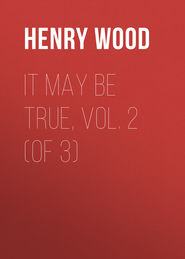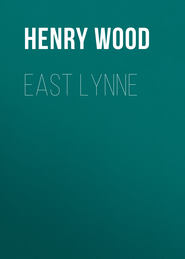По всем вопросам обращайтесь на: info@litportal.ru
(©) 2003-2024.
✖
Johnny Ludlow, Sixth Series
Настройки чтения
Размер шрифта
Высота строк
Поля
“No need to tell him,” quoth Mr. Harry.
“And—of course—we must part. You and I.”
“Indeed! Who says so?”
“I am not sure that it would be right to—to—you know.”
“To what? Go on, my dear.”
Alice sighed; her eyes were fixed thoughtfully on the fast-falling twilight. “Mrs. Carradyne will not care for me when she knows who I am,” she said in low tones.
“My dear, shall I tell you how it strikes me?” returned Harry: “that my mother will be only the more anxious to have you connected with us by closer and dearer ties, so as to atone to you, in even a small degree, for the cruel wrong which fell upon your father. As to me—it shall be made my life’s best and dearest privilege.”
But when a climax such as this takes place, the right or the wrong thing to be done cannot be settled in a moment. Alice West did not see her way quite clearly, and for the present she neither said nor did anything.
This little matter occurred on the Friday in Christmas week; on the following day, Saturday, Mrs. Hamlyn was returning to London. Christmas Day this year had fallen on a Monday. Some old wives hold a superstition that when that happens, it inaugurates but small luck for the following year, either for communities or for individuals. Not that that fancy has anything to do with the present history. Captain Monk’s banquet would not be held until the Monday night: as was customary when New Year’s Eve fell on a Sunday. He had urged his daughter to remain over New Year’s Day; but she declined, on the plea that as she had been away from her husband on Christmas Day, she would like to pass New Year’s Day with him. The truth being that she wanted to get to London to see after that yellow-haired lady who was supposed to be peeping after Philip Hamlyn.
On the Saturday morning Mrs. Hamlyn was driven to Evesham in the close carriage, and took the train to London. Her husband, ever kind and attentive, met her at the Paddington terminus. He was looking haggard, and seemed to be thinner than when she left him nine days ago.
“Are you well, Philip?” she asked anxiously.
“Oh, quite well,” quickly answered poor Philip Hamlyn, smiling a warm smile, that he meant to look like a gay one. “Nothing ever ails me.”
No, nothing might ail him bodily; but mentally—ah, how much! That awful terror lay upon him thick and threefold; it had not yet come to any solution, one way or the other. Major Pratt had taken up the very worst view of it; and spent his days pitching hard names at misbehaving syrens, gifted with “the deuce’s own cunning” and with mermaids’ shining hair.
“And how have things been going, Penelope?” asked Mrs. Hamlyn of the nurse, as she sat in the nursery with her boy upon her knee. “All right?”
“Quite so, ma’am. Master Walter has been just as good as gold.”
“Mamma’s darling!” murmured the doting mother, burying her face in his. “I have been thinking, Penelope, that your master does not look well,” she added after a minute.
“No, ma’am? I’ve not noticed it. We have not seen much of him up here; he has been at his club a good deal—and dined three or four times with old Major Pratt.”
“As if she would notice it!—servants never notice anything!” thought Eliza Hamlyn in her imperious way of judging the world. “By the way, Penelope,” she said aloud in light and careless tones, “has that woman with the yellow hair been seen about much?—has she presumed again to accost my little son?”
“The woman with the yellow hair?” repeated Penelope, looking at her mistress, for the girl had quite forgotten the episode. “Oh, I remember—she that stood outside there and came to us in the square-garden. No, ma’am, I’ve seen nothing at all of her since that day.”
“For there are wicked people who prowl about to kidnap children,” continued Mrs. Hamlyn, as if she would condescend to explain her inquiry, “and that woman looked like one. Never suffer her to approach my darling again. Mind that, Penelope.”
The jealous heart is not easily reassured. And Mrs. Hamlyn, restless and suspicious, put the same question to her husband. It was whilst they were waiting in the drawing-room for dinner to be announced, and she had come down from changing her apparel after her journey. How handsome she looked! a right regal woman! as she stood there arrayed in dark blue velvet, the firelight playing upon her proud face, and upon the diamond earrings and brooch she wore.
“Philip, has that woman been prowling about here again?”
Just for an imperceptible second, for thought is quick, it occurred to Philip Hamlyn to temporize, to affect ignorance, and say, What woman? just as if his mind was not full of the woman, and of nothing else. But he abandoned it as useless.
“I have not seen her since; not at all,” he answered: and though his words were purposely indifferent, his wife, knowing all his tones and ways by heart, was not deceived. “He is afraid of that woman,” she whispered to herself; “or else afraid of me.” But she said no more.
“Have you come to any definite understanding with Mr. Carradyne in regard to Peacock’s Range, Eliza?”
“He will not come to any; he is civilly obstinate over it. Laughs in my face with the most perfect impudence, and tells me: ‘A man must be allowed to put in his own claim to his own house, when he wants to do so.’”
“Well, Eliza, that seems to be only right and fair. Peveril made no positive agreement with us, remember.”
“Is it right and fair? That may be your opinion, Philip, but it is not mine. We shall see, Mr. Harry Carradyne!”
“Dinner is served, ma’am,” announced the old butler.
That evening passed. Sunday passed, the last day of the dying year; and Monday morning, New Year’s Day, dawned.
New Year’s Day. Mr. and Mrs. Hamlyn were seated at the breakfast-table. It was a bright, cold, sunny morning, showing plenty of blue sky. Young Master Walter, in consideration of the day, was breakfasting at their table, seated in his high chair.
“Me to have dinner wid mamma to-day! Me have pudding!”
“That you shall, my sweetest; and everything that’s good,” assented his mother.
In came Japhet at this juncture. “There’s a little boy in the hall, sir, asking to see you,” said he to his master. “He–”
“Oh, we shall have plenty of boys here to-day, asking for a new year’s gift,” interposed Mrs. Hamlyn, rather impatiently. “Send him a shilling, Philip.”
“It’s not a poor boy, ma’am,” answered Japhet, “but a little gentleman: six or seven years old, he looks. He says he particularly wants to see master.”
Philip Hamlyn smiled. “Particularly wants a shilling, I expect. Send him in, Japhet.”
The lad came in. A well-dressed beautiful boy, refined in looks and demeanour, bearing in his face a strange likeness to Mr. Hamlyn. He looked about timidly.
Eliza, struck with the resemblance, gazed at him. Her husband spoke. “What do you want with me, my lad?”
“If you please, sir, are you Mr. Hamlyn?” asked the child, going forward with hesitating steps. “Are you my papa?”
Every drop of blood seemed to leave Philip Hamlyn’s face and fly to his heart. He could not speak, and looked white as a ghost.
“Who are you? What is your name?” imperiously demanded Philip’s wife.
“It is Walter Hamlyn,” replied the lad, in clear, pretty tones.
And now it was Mrs. Hamlyn’s turn to look white. Walter Hamlyn?—the name of her own dear son! when she had expected him to say Sam Smith, or John Jones! What insolence some people had!
“Where do you come from, boy? Who sent you here?” she reiterated.
“I come from mamma. She would have sent me before, but I caught cold, and was in bed all last week.”
Mr. Hamlyn rose. It was a momentous predicament, but he must do the best he could in it. He was a man of nice honour, and he wished with all his heart that the earth would open and engulf him. “Eliza, my love, allow me to deal with this matter,” he said, his voice taking a low, tender, considerate tone. “I will question the boy in another room. Some mistake, I reckon.”
“No, Philip, you must put your questions before me,” she said, resolute in her anger. “What is it you are fearing? Better tell me all, however disreputable it may be.”
“I dare not tell you,” he gasped; “it is not—I fear—the disreputable thing you may be fancying.”
“Not dare! By what right do you call this gentleman ‘papa’?” she passionately demanded of the child.
“And—of course—we must part. You and I.”
“Indeed! Who says so?”
“I am not sure that it would be right to—to—you know.”
“To what? Go on, my dear.”
Alice sighed; her eyes were fixed thoughtfully on the fast-falling twilight. “Mrs. Carradyne will not care for me when she knows who I am,” she said in low tones.
“My dear, shall I tell you how it strikes me?” returned Harry: “that my mother will be only the more anxious to have you connected with us by closer and dearer ties, so as to atone to you, in even a small degree, for the cruel wrong which fell upon your father. As to me—it shall be made my life’s best and dearest privilege.”
But when a climax such as this takes place, the right or the wrong thing to be done cannot be settled in a moment. Alice West did not see her way quite clearly, and for the present she neither said nor did anything.
This little matter occurred on the Friday in Christmas week; on the following day, Saturday, Mrs. Hamlyn was returning to London. Christmas Day this year had fallen on a Monday. Some old wives hold a superstition that when that happens, it inaugurates but small luck for the following year, either for communities or for individuals. Not that that fancy has anything to do with the present history. Captain Monk’s banquet would not be held until the Monday night: as was customary when New Year’s Eve fell on a Sunday. He had urged his daughter to remain over New Year’s Day; but she declined, on the plea that as she had been away from her husband on Christmas Day, she would like to pass New Year’s Day with him. The truth being that she wanted to get to London to see after that yellow-haired lady who was supposed to be peeping after Philip Hamlyn.
On the Saturday morning Mrs. Hamlyn was driven to Evesham in the close carriage, and took the train to London. Her husband, ever kind and attentive, met her at the Paddington terminus. He was looking haggard, and seemed to be thinner than when she left him nine days ago.
“Are you well, Philip?” she asked anxiously.
“Oh, quite well,” quickly answered poor Philip Hamlyn, smiling a warm smile, that he meant to look like a gay one. “Nothing ever ails me.”
No, nothing might ail him bodily; but mentally—ah, how much! That awful terror lay upon him thick and threefold; it had not yet come to any solution, one way or the other. Major Pratt had taken up the very worst view of it; and spent his days pitching hard names at misbehaving syrens, gifted with “the deuce’s own cunning” and with mermaids’ shining hair.
“And how have things been going, Penelope?” asked Mrs. Hamlyn of the nurse, as she sat in the nursery with her boy upon her knee. “All right?”
“Quite so, ma’am. Master Walter has been just as good as gold.”
“Mamma’s darling!” murmured the doting mother, burying her face in his. “I have been thinking, Penelope, that your master does not look well,” she added after a minute.
“No, ma’am? I’ve not noticed it. We have not seen much of him up here; he has been at his club a good deal—and dined three or four times with old Major Pratt.”
“As if she would notice it!—servants never notice anything!” thought Eliza Hamlyn in her imperious way of judging the world. “By the way, Penelope,” she said aloud in light and careless tones, “has that woman with the yellow hair been seen about much?—has she presumed again to accost my little son?”
“The woman with the yellow hair?” repeated Penelope, looking at her mistress, for the girl had quite forgotten the episode. “Oh, I remember—she that stood outside there and came to us in the square-garden. No, ma’am, I’ve seen nothing at all of her since that day.”
“For there are wicked people who prowl about to kidnap children,” continued Mrs. Hamlyn, as if she would condescend to explain her inquiry, “and that woman looked like one. Never suffer her to approach my darling again. Mind that, Penelope.”
The jealous heart is not easily reassured. And Mrs. Hamlyn, restless and suspicious, put the same question to her husband. It was whilst they were waiting in the drawing-room for dinner to be announced, and she had come down from changing her apparel after her journey. How handsome she looked! a right regal woman! as she stood there arrayed in dark blue velvet, the firelight playing upon her proud face, and upon the diamond earrings and brooch she wore.
“Philip, has that woman been prowling about here again?”
Just for an imperceptible second, for thought is quick, it occurred to Philip Hamlyn to temporize, to affect ignorance, and say, What woman? just as if his mind was not full of the woman, and of nothing else. But he abandoned it as useless.
“I have not seen her since; not at all,” he answered: and though his words were purposely indifferent, his wife, knowing all his tones and ways by heart, was not deceived. “He is afraid of that woman,” she whispered to herself; “or else afraid of me.” But she said no more.
“Have you come to any definite understanding with Mr. Carradyne in regard to Peacock’s Range, Eliza?”
“He will not come to any; he is civilly obstinate over it. Laughs in my face with the most perfect impudence, and tells me: ‘A man must be allowed to put in his own claim to his own house, when he wants to do so.’”
“Well, Eliza, that seems to be only right and fair. Peveril made no positive agreement with us, remember.”
“Is it right and fair? That may be your opinion, Philip, but it is not mine. We shall see, Mr. Harry Carradyne!”
“Dinner is served, ma’am,” announced the old butler.
That evening passed. Sunday passed, the last day of the dying year; and Monday morning, New Year’s Day, dawned.
New Year’s Day. Mr. and Mrs. Hamlyn were seated at the breakfast-table. It was a bright, cold, sunny morning, showing plenty of blue sky. Young Master Walter, in consideration of the day, was breakfasting at their table, seated in his high chair.
“Me to have dinner wid mamma to-day! Me have pudding!”
“That you shall, my sweetest; and everything that’s good,” assented his mother.
In came Japhet at this juncture. “There’s a little boy in the hall, sir, asking to see you,” said he to his master. “He–”
“Oh, we shall have plenty of boys here to-day, asking for a new year’s gift,” interposed Mrs. Hamlyn, rather impatiently. “Send him a shilling, Philip.”
“It’s not a poor boy, ma’am,” answered Japhet, “but a little gentleman: six or seven years old, he looks. He says he particularly wants to see master.”
Philip Hamlyn smiled. “Particularly wants a shilling, I expect. Send him in, Japhet.”
The lad came in. A well-dressed beautiful boy, refined in looks and demeanour, bearing in his face a strange likeness to Mr. Hamlyn. He looked about timidly.
Eliza, struck with the resemblance, gazed at him. Her husband spoke. “What do you want with me, my lad?”
“If you please, sir, are you Mr. Hamlyn?” asked the child, going forward with hesitating steps. “Are you my papa?”
Every drop of blood seemed to leave Philip Hamlyn’s face and fly to his heart. He could not speak, and looked white as a ghost.
“Who are you? What is your name?” imperiously demanded Philip’s wife.
“It is Walter Hamlyn,” replied the lad, in clear, pretty tones.
And now it was Mrs. Hamlyn’s turn to look white. Walter Hamlyn?—the name of her own dear son! when she had expected him to say Sam Smith, or John Jones! What insolence some people had!
“Where do you come from, boy? Who sent you here?” she reiterated.
“I come from mamma. She would have sent me before, but I caught cold, and was in bed all last week.”
Mr. Hamlyn rose. It was a momentous predicament, but he must do the best he could in it. He was a man of nice honour, and he wished with all his heart that the earth would open and engulf him. “Eliza, my love, allow me to deal with this matter,” he said, his voice taking a low, tender, considerate tone. “I will question the boy in another room. Some mistake, I reckon.”
“No, Philip, you must put your questions before me,” she said, resolute in her anger. “What is it you are fearing? Better tell me all, however disreputable it may be.”
“I dare not tell you,” he gasped; “it is not—I fear—the disreputable thing you may be fancying.”
“Not dare! By what right do you call this gentleman ‘papa’?” she passionately demanded of the child.











